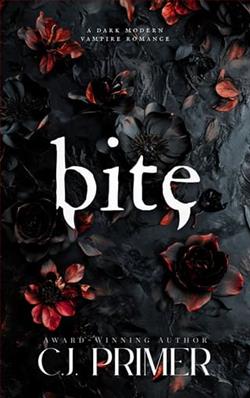Page 27 of Crimson Curse
“Twelve million in losses,” Timur rumbles, his first words since we returned. “Three shipments of legitimate artwork bound for European collectors. Two crates of less legitimate materials heading to Montreal. All destroyed.”
The legitimate losses hurt, but they're replaceable. The other cargo represents months of careful planning. These connections took years to establish, and trust that can't be rebuilt overnight.Lucien didn't just attack a building. He attacked the foundation of everything I've built.
“He's testing our response time,” I observe. “Wants to see how we regroup, and where we're vulnerable.”
“There's more,” Roman adds, pulling a tablet from his jacket. “I found this embedded in the debris near the main entrance.”
He slides the device across the desk. The screen shows a single image: a black and white photograph of the warehouse, taken from an elevated position. But it's not the timing that locks the air in my lungs. It's what's written across the bottom in precise, elegant script:For old times' sake.
Lucien documented his handiwork like a tourist taking pictures at a landmark. The arrogance of it, and the casual cruelty, reminds me exactly who I'm dealing with. This isn't Viktor's impulsive rage or some rival family's territorial dispute. This is personal.
A soft knock interrupts my thoughts. The door opens, and Naomi steps inside, her face pale but determined. She's changed from her sleep clothes into jeans and a sweater, her auburn hair pulled back in a simple ponytail. The sight of her, clean and safe and alive, should bring comfort. Instead, it amplifies the guilt gnawing at my chest.
“I heard the trucks return,” she says quietly. “Are you hurt?”
The question is simple, but it opens something inside me I'm not ready to face. Physical wounds heal. The kind of damage Lucien inflicted tonight runs deeper.
“I'm fine,” I reply, though we both know it's not entirely true.
She steps closer, her eyes taking in the ash-stained clothes, the soot on my hands, and the fragment of the plaque sitting like an accusation on my desk. “What happened?”
“Business,” I answer curtly.
But Naomi doesn't retreat.
“Leave us,” I command my men.
They file out without question, though Lex pauses at the door long enough to catch my eye. His look holds a warning: don't let this consume you. But consumption is exactly what I need right now. I need the fire of grief to burn away everything soft, and everything human that might make me hesitate when the time comes to return Lucien's message in blood.
Naomi moves around the desk and places her hand on my chest. The touch is gentle but firm.
“You don't have to carry this alone,” she whispers.
I want to believe her, but she's wrong. This is exactly what I have to carry alone. The burden of command, the cost of decisions, and the blood on my hands is mine to bear.
“They died because of me,” I growl, the words torn from somewhere deep in my soul.
Her hand doesn't move. “They died because someone else chose violence. That's not the same thing.”
But it is the same thing. In this world, every choice ripples outward, touching lives that never asked to be touched. Sergei and Anton died because I built something Lucien wanted to destroy. Their families will grieve because I painted a target on everything I control.
I can't be touched right now, not by comfort, forgiveness, or the promise that somehow this pain will pass. The rage needs somewhere to go, and if I let her kindness soften it even slightly, I might lose the edge I need to end this war that should have ended five years ago when he took Sasha from me.
Naomi's hand lingers on my chest for another moment before she withdraws it. “When you're ready,” she breathes, “I'll be here.”
Then she's gone, leaving me alone with the wreckage of the night.
The house settles into quiet around me as dawn breaks over Chicago. Somewhere in the distance, sirens wail. The world moves forward while I sit in my office, staring at a piece of burned metal that represents everything I've failed to protect.
But failure is just another word for motivation. Lucien made his move, showed his hand, and proved that no distance is too far when revenge drives the blade. Now it's my turn.
I pick up the phone and dial a number I haven't used in two years. It rings once before a gravelly voice answers in a thick Russian accent.
“I wasn't expecting to hear from you, Daniil Zorin.”
“I need a favor, Melor.”
“After Monaco? You're lucky I'm answering at all.”















